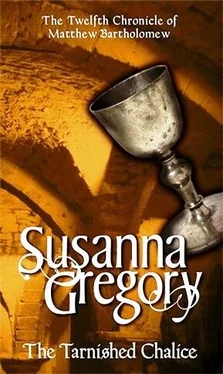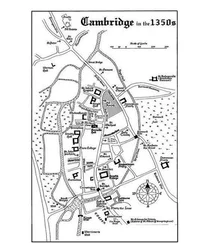‘Shameful,’ agreed Cynric with considerable feeling.
‘Whatton mentioned a murder earlier,’ said Suttone, glancing towards the door to ensure it could be barred from the inside. ‘But he did not say whether you had caught the culprit.’
‘We have not,’ replied Whatton, standing up as the logs caught at last. ‘But there is no need for alarm. I doubt the killer will attack anyone else.’
‘How can you be so sure?’ asked Michael suspiciously.
Whatton smiled serenely. ‘Because of the man Aylmer was – debauched, sly and dishonest. No one was surprised when he was found dead with a dagger in his back.’
‘Do you mean John Aylmer?’ asked Suttone. He swallowed hard. ‘From Huntingdonshire?’
Hamo nodded. ‘You know him? He was certainly the kind of fellow to stick in a man’s mind.’
‘He is certainly stuck in mine,’ said Suttone weakly. ‘He is my Vicar Choral.’
‘I cannot wait until tomorrow,’ said Bartholomew, pacing up and down in the guest-hall. The Gilbertines had gone, Suttone was out in search of the latrine, and the physician was alone with Michael and Cynric. ‘I keep thinking Hamo may be right – that Spayne might know where Matilde is now. If he was going to marry her six years ago, then they were obviously close.’
Michael inclined his head. ‘But think about her arrival in Cambridge, Matt. It was roughly six years ago, so she probably went there immediately after she left him. She mentioned this betrothal to you once, which suggests that either they parted on bad terms or he did not mean that much to her. Do not rush this. You waited the best part of a term before coming to investigate this particular lead, so surely you can manage a few more hours?’
Bartholomew was not sure he could. The possibility, however remote, that Spayne might be able to help him gnawed at his senses like a worm. ‘I know it is dark, but it is not late, and I cannot see Spayne being in his bed before seven o’clock. I am going to see him tonight.’
‘It is not wise to wander around strange towns after dusk,’ said Michael gently. ‘You know this.’
‘I will go with you,’ offered Cynric, seeing the physician was not to be dissuaded. He stood and slipped his sword into his belt.
Michael looked around for his cloak. ‘Then so will I. Cynric can protect you with his blade, and my habit may make footpads think twice about molesting you.’
‘It did not work yesterday,’ Cynric pointed out ruefully.
‘True,’ agreed Michael. ‘So we shall say a prayer before we go. In the chapel.’
‘You mean the chapel that lady went into?’ asked Bartholomew, smiling. ‘Then go and fulfil your religious obligations, Brother. I do not need an escort.’
Michael was right: it was dangerous to explore unknown cities at night, and Bartholomew did not want to put his friends at risk just because he was impatient. They listened to his arguments for them remaining with the Gilbertines, then followed him outside anyway. Snow lay in untidy heaps, where it had been swept, and the ground was slick with hoarfrost.
‘You have been more than patient with my hunt,’ said Bartholomew, buckling his sword to his waist as they walked across the yard. He never carried weapons in Cambridge, but his travels in France and along some of England’s robber-infested highways meant he was now more cautious. ‘Both of you. And I shall make you a promise: this is the last time I race off in search of shadows. If I cannot find Matilde this time, I shall concede defeat.’
‘I shall hold you to it,’ warned Michael, selecting a tortuous route that avoided the bigger drifts. ‘You cannot spend the rest of your life haring around countries with which we are at war, and we need you at Michaelhouse. We have students eager to study with you – you taught them more last term than Doctor Rougham managed in a year – and England needs University-trained physicians. If Suttone is right, and the Death is about to come back, the importance of your work cannot be overestimated.’
‘You give me too much credit. Physicians were worthless during the plague – worse than worthless, even, since I sometimes wonder whether our advice and practices made it worse. But even if we cannot cure the pestilence, then I suppose there are other ailments to treat. We still have our uses.’
‘You do,’ agreed Michael. ‘Oh, look! We just happen to be at the Gilbertines’ church. Give me a few moments to say my prayers, and then we shall visit Spayne together.’
The Chapel of St Katherine was an attractive building, which had been raised by Normans. It boasted small roundheaded windows, and the arches in the nave were adorned with brightly painted dog-tooth mouldings. Its chancel was longer than its nave, although not as wide, and its stone floor made their footsteps echo as they walked towards the high altar. It smelled damp, as though the roof was leaking somewhere, and it was icy cold. It was also empty, although a doused but still-warm lamp suggested that Dame Eleanor and Lady Christiana had not long left their devotions.
Michael grimaced before kneeling to recite a psalm of deliverance. Unlike Bartholomew, who enjoyed being on the road and seeing new sights, the monk considered travel a dreadful ordeal, and was genuinely grateful to have arrived in Lincoln unscathed. While he chanted, Bartholomew wondered what it was about Lady Christiana that had caught Michael’s attention, thinking she could not hold a candle to Matilde’s radiant beauty. But then, he acknowledged wryly, he could not look at a woman without comparing her unfavourably to Matilde these days. It was hardly healthy, and he knew he should stop before he drove himself insane.
‘You should leave some coins,’ Michael called over his shoulder, as he climbed inelegantly to his feet. ‘St Katherine will appreciate them, and we need all the good graces we can muster, since we have to ride home again in two weeks.’
When Bartholomew did as the monk suggested, he saw others had left oblations, too. In pride of place was a silver chalice. It was a simple thing, quite small, and its tarnished appearance suggested it had seen better days. Other people had used it as a receptacle, and several pennies and a ring lay on its bottom. Bartholomew dropped his offering in with them, then stood in the shadows, waiting with poorly concealed impatience for the monk to finish.
Eventually, Michael was ready and they left the priory, ignoring the unhappy strictures of Whatton at the gate, who told them they would miss supper if they took too long. Bartholomew was not hungry, his appetite vanished at the prospect of new information, while in his newly ‘slender’ form, Michael had trained himself to miss the occasional repast. And Cynric was an old soldier, used to eating at irregular times, and was adept at obtaining what he wanted from locked kitchens anyway.
The first obstacle they were obliged to surmount was a tall, narrow structure known as the West Bargate. It straddled a foul-smelling dyke, and comprised a vaulted arch with a stout wooden gate – the heavy bar that secured the gate from inside gave the building its name – and a guard-room above. Smoke issued from the chimney, and a good deal of hammering and shouting was required before the soldier could be persuaded to leave his cosy domain. Once they had his attention, it cost fourpence to be allowed through, and another fourpence to extract the promise that they would be let out again later, to return to their lodgings.
Bartholomew expected to find himself in the city once they had passed under the West Bargate’s dripping portal, and was surprised when the guard said Lincoln was still a mile away: the churches and houses that lined the road ahead comprised the elongated suburb-settlement of Wigford.
Читать дальше












